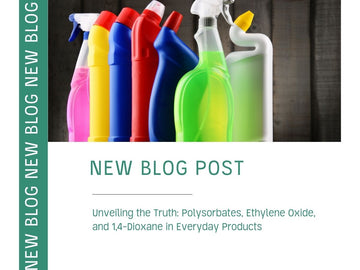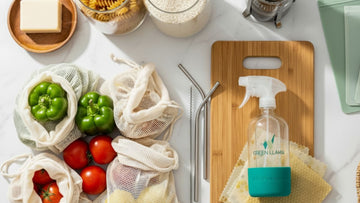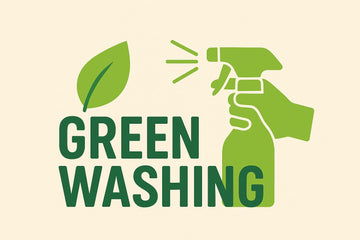Unveiling the Truth: Polysorbates, Ethylene Oxide, and 1,4-Dioxane in Everyday Products
by Matt Keasey on Feb 28, 2024
Polysorbates are widely used emulsifiers that help oil and water mix in various products, including cosmetics, pharmaceuticals, and food. However, concerns have arisen about their safety due to the potential presence of ethylene oxide and 1,4-dioxane, contaminants introduced during the production process.
Understanding Polysorbates and Their Production
Polysorbates are created by ethoxylating sorbitol, derived from vegetable sources like corn, with ethylene oxide. This process can result in the formation of 1,4-dioxane, a by-product with potential health risks. Polysorbate 20, for instance, is commonly found in personal care products due to its emulsifying properties, helping blend ingredients into a cohesive product (Essential Wholesale & Labs).
The Concern: Ethylene Oxide and 1,4-Dioxane Contamination
Ethylene oxide is a known human carcinogen, and 1,4-dioxane is considered a possible human carcinogen. These substances can remain in the final product as residuals from the manufacturing process. Despite processes designed to minimize these contaminants, their presence, even in low quantities, raises safety concerns (Essential Wholesale & Labs; Pet Shampoo Ingredient Database).
Regulatory Perspectives and Safety Evaluations
Regulatory bodies, including the FDA and WHO, have deemed polysorbates safe for use within specified limits. However, the potential for allergic reactions or skin irritation in some individuals cannot be overlooked. The David Suzuki Foundation and the Environmental Working Group (EWG) provide guidance on identifying and avoiding products with potential contaminants, advocating for more stringent regulations and transparent labeling to protect consumer health.
Common Products Containing Polysorbates
Polysorbates are found in a variety of cleaning products due to their effectiveness in dissolving oils and dirt. These include shampoos, facial cleansers, and body washes, where they contribute to the product's texture and stability. The push for safer alternatives has gained momentum, highlighting the importance of informed consumer choices and manufacturer responsibility in ensuring product safety.
Moving Forward: Safer Alternatives and Informed Choices
The ongoing discussion around polysorbates emphasizes the need for continued research, stricter regulatory standards, and greater transparency in product labeling. Consumers are encouraged to stay informed about the ingredients in their products and consider alternatives that prioritize health and environmental safety.
For further information on polysorbates and their safety, please refer to the following sources:





